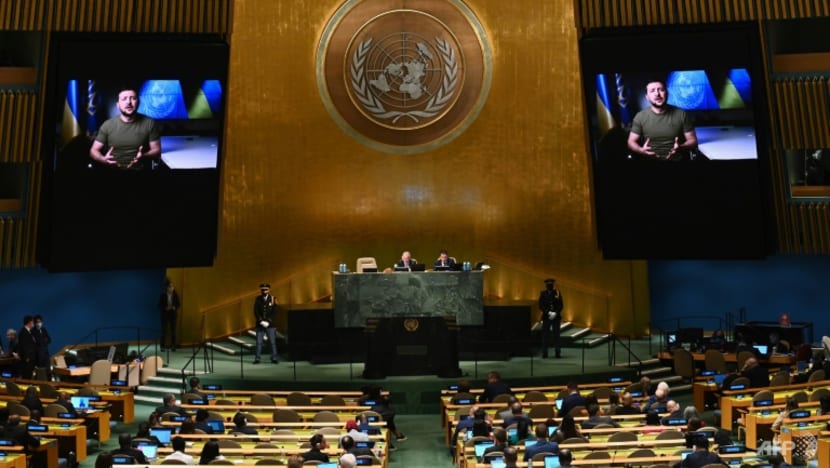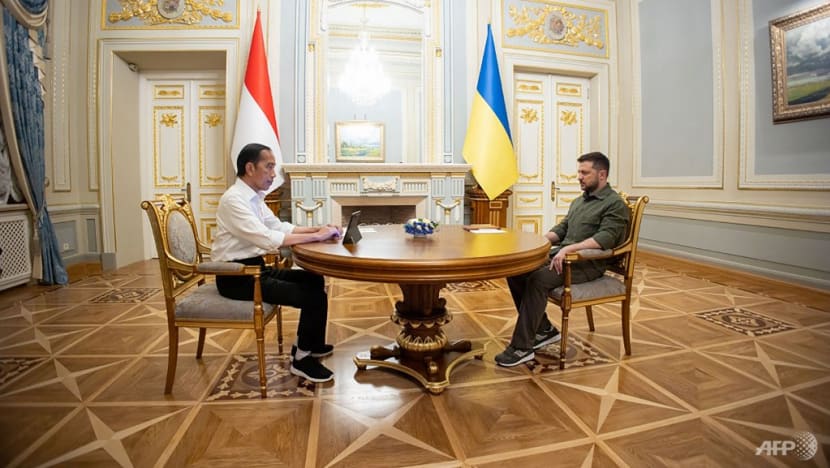Commentary: Skipping UN General Assembly is bad policy for Jakarta
By sitting on the sidelines during a moment of global crisis, Indonesian President Joko Widodo falls short, says Bloomberg Opinion's Clara Ferreira Marques.

Addressing the UN General Assembly via video, Ukrainian President Volodymyr Zelenskyy urged the UN to punish Russia for its invasion. (Photo: AFP/ANGELA WEISS)
SINGAPORE: When Indonesia’s Joko Widodo visited Ukraine and Russia this summer, Foreign Minister Retno Marsudi explained the president was “choosing to try to contribute, instead of choosing to be quiet". And yet now, with the world at a perilous juncture, he has bafflingly chosen silence.
Jokowi, as the president is known, is once again sitting out the United Nations’ General Assembly, the annual marquee event of global diplomacy. This year, it’s an inexcusable absence.
Granted, he is not the only missing leader. Chinese President Xi Jinping, weeks away from a party congress that will anoint him for a precedent-breaking third term, is staying home, as is Indian Prime Minister Narendra Modi. Nor is the non-attendance out of character for Jokowi, who has long put domestic policy first, and in close to eight years in office has addressed the UN gathering only when pandemic restrictions allowed remote interventions.
But this is not a routine meeting. Trust among global powers is at a low, and the world is grappling with compounding crises, most immediately with the fallout from Russia’s assault on Ukraine that has been particularly punishing for the emerging world, with rising fuel and food prices, and the menace of broader instability.
Moscow is threatening to torpedo a deal allowing grain exports to flow. It’s the disaster Jokowi supposedly sought to fix with his travels back in June.

INDONESIA AT THE "PINNACLE OF GLOBAL LEADERSHIP"
It’s also happening at what may be a turning point for the war, as losses of men and material pile up for Russia, while China and India - who initially embraced what might be called pro-Russian neutrality - begin to signal displeasure.
The pressure is having an impact on Russian President Vladimir Putin, now struggling to find a way out of this debacle of his own creation. (Moscow has announced votes in occupied territories and a partial mobilisation.) Indonesia too has clout, as Russia needs large, populous, fuel-importing economies to avoid isolation.
Nor is it a run-of-the-mill year for Jokowi himself, nearer the end than the beginning of his time in office, and thinking about his legacy.
He holds the presidency of the G20 and will host world leaders - including, supposedly, Putin and his Ukrainian counterpart Volodymyr Zelenskyy - for the year’s banner get-together in Bali, before taking the chairmanship of the Association of Southeast Asian Nations next year. Indonesia is, as Jokowi put it last month, at the “pinnacle of global leadership".
JOKOWI'S DISTASTE FOR GEOPOLITICAL THEATRE
So why isn’t the Indonesian leader in New York?
Jokowi’s distaste for geopolitical theatre is well-known, especially compared with his predecessor, Susilo Bambang Yudhoyono, and while his personal appeal has opened doors overseas, he has tended to focus on investment benefits.
In analyst and former journalist Ben Bland’s book on the Indonesian leader, a Jakarta official puts it well: “Jokowi’s view would be, why do I have to go to the United Nations, there’s no money there and in fact we have to pay them.” An inward-looking approach not so unusual, as Bland, now at Chatham House in London, points out, in the context of Southeast Asia today.
Yes, in his early years, the president had good reasons to concentrate on the home front - without an elite background or military ties, he needed to build a power base.
But his second term, now supported by a broad coalition, was supposed to be the moment to look further afield. That hasn’t happened. While there have been creditable efforts, as with the visits to Kyiv and Moscow, they have mostly fizzled out, suggesting the projection back home really did matter as much if not more than the outcome.
DOMESTIC REASONS
And this time, as ever, there were domestic reasons for Jokowi to stay put.
Radityo Dharmaputra, who lectures in international relations at Universitas Airlangga, points to widespread discontent over rising prices that has prompted demonstrations in Jakarta, and to the president’s growing concern with the end of his term in 2024 and whatever lies beyond that. He cannot stand again, though local media have floated the vice presidency.
All those headaches will matter more than the United Nations and the world stage - even if they shouldn’t. After all, continued disaster in Ukraine spells only bad news back home.
Indonesia, the world’s largest Muslim nation and the most populous in Southeast Asia, has long punched below its weight in international politics and this year should have been a moment to begin to rectify that. More to the point, its foreign policy has long rested on the idea of bebas-aktif - a role in world affairs that is both independent and active.
By sitting on the sidelines during a moment of global crisis, Jokowi falls short.



















